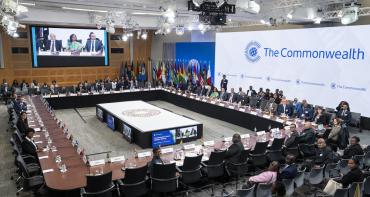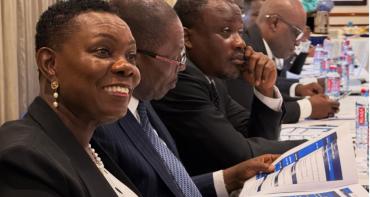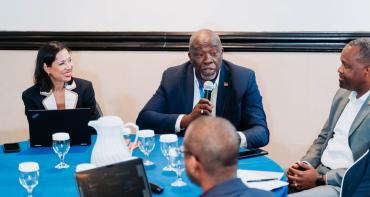Government Ministers and policy advisers met at the Commonwealth’s headquarters in London today for a panel debate on how best to promote those governance systems which will best deliver the Sustainable Development Goals.

Government Ministers and policy advisers met at the Commonwealth’s headquarters in London today for a panel debate on how best to promote those governance systems which will best deliver the Sustainable Development Goals.
“In September it will be a year since global agreement was reached on the Agenda 2030 for Sustainable Development following what was an extensive and inclusive process of consultation,” said Commonwealth Secretary-General Patricia Scotland, who opened the meeting.
“The agenda really defines the global aspirations of us all going forward. This unanimous endorsement defines the global development priorities for the next 15 years. These are our Commonwealth priorities too,” she added, “and it is clear to me that all our work must be directed towards helping our member states to reach these goals.”
Three specialists, Dr Ebba Dohlman Senior Adviser on Policy Coherence at the Organisation for Economic Co-operation and Development, Audley Shaw, Jamaica’s Minister of Finance, and Dato Sri Idris Jala, Minister in the Prime Minister’s Office of Malaysia, led a panel debate to share their experiences of working towards the Sustainable Development Goals with Commonwealth High Commissioners, ministers and guests attending the event.
“The 2013 Agenda for Sustainable Development adopted by the member states presents a historic opportunity for Jamaica and other Caribbean countries to address some of the regions’ most urgent priorities,” Audley Shaw said.
“These include income and gender inequality, promoting inclusive economic growth with decent work for everyone, while creating sustainable cities and communities, addressing climate change. Vision 2030 in Jamaica’s experience is our country’s first long term national development plan, which aims to put Jamaica in a position to achieve developed country status by 2030,” he added.
Fellow panellist Dato Sri Idris Jala share with delegates his experiences of advocating for change in the Asian country. “There are five problems that get in the way of delivery. Firstly, there is not enough clarity amongst leaders in countries with regards to where they are heading and what their key priorities are.
“Forcing the leadership to pick priorities is one of the most difficult things to do in a government. Secondly – the lack of leadership commitment – people pay lip service to it.
“Thirdly and most importantly, most governments, in my view, have strategies at 30,00 ft. You don’t implement things at 30,000ft. You’ve got to translate high-level strategies into practical 3ft programmes for implementation.
“Civil servants are not rewarded for taking risks – they are penalised for risk-taking when they get it wrong. There are no bonuses for doing things differently. In my view this is a very big disease of governments.
“Fourthly, public demands and inputs are not adequately heard. We talk a lot about doing things for the public but never really go out there and get input on concrete details.
“Fifthly, it’s accountability – what do you do with Ministers who don’t deliver?"
Mr Jala highlighted that during his tenure of working at the centre of government, he was able to make radical changes, which yielded significant and wide-ranging improvement, benefitting the country.
“The first thing we did in Malaysia was to get all the cabinet ministers, including the Prime Minister, and we locked them in the room over five weekends until and unless they agree the priorities. We agreed to not move until we approve the priorities.
“Goal setting, prioritising projects, and adopting a granular approach to strategic implementation are central to effective government,” he said.
Ebba Dohlman highlighted the need for policy coherence for development and the EU’s approach using this policy tool. “Three key elements of policy coherence support sustainable development,” he said.
“First – identifying and managing the interaction trade-offs. As you implement SDGs, there will trade-offs between well-being here and now on the domestic front, trade-offs between future generations, and also in terms of impacts elsewhere.
“The second element is to establish and adapt institutions that are fit for purpose to help reconcile these trade-offs. The third critical element is that one has to assess policy effects at all stages of the policy-making process, she said.
The Commonwealth Secretariat is committed to working with its member states and partners in their effort to achieve the Sustainable Development Goals by 2030, and help fulfil a pledge to build effective, accountable and inclusive institutions at all levels.



